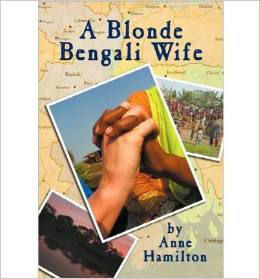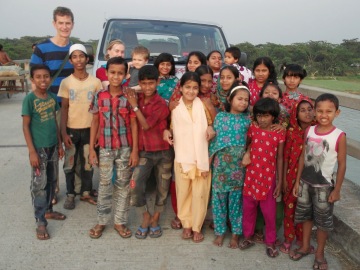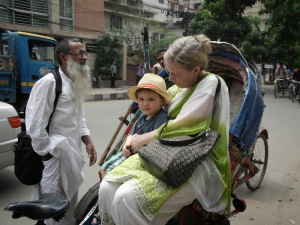Today we have Anne Hamilton here with us to discuss her book, A Blonde Bengali Wife. Some of you may know Anne as the editor of Lothian Life, others as a writing tutor with writingclasses.co.uk, and yet others as an excellent editor.
Welcome, Dr Hamilton!
Firstly, I’d just like to say a big congratulations to Anne on recently receiving her PhD in Creative Writing from the University of Glasgow! That’s a massive achievement, which I’m sure readers would love to hear more about. Could you tell us, briefly, how studying for an advanced degree has benefitted your writing practice?
Thank you very much, Kendra, and for inviting me onto your blog! The PhD has actually helped me in the most practical ways. The bulk of my thesis had to be a novel – and I’d never even attempted a novel before. Like most writers I know, I suffer from huge crises of confidence and having experienced and enthusiastic supervisors (both published writers) encouraged me to think I could do it, and that I am a good (enough) writer. Having a sounding board for ideas and being given clear deadlines was invaluable, but the most useful by-product was that I stopped procrastinating – believe me, I used to be the world’s worst procrastinator – until suddenly I had all this academic and creative work to do, as well as earning a living, and looking after my little boy.
When did you first publish A Blonde Bengali Wife and how did the book come about?
A Blonde Bengali Wife is now embarking on her second life. The original version, in hard copy and eBook, was published by LL-Publications, a Glasgow publisher, in 2010. My five year contract was up this summer, and this coincided with the publisher relocating to the USA. Since I was still selling a few copies and getting good reviews, I made the decision to self-publish this reprint.
A Blonde Bengali Wife is a travel memoir, hopefully humorous, that tells the story of my first (of, to date, about twelve) visits to Bangladesh. In the West, this fascinating country generally only hits the news with stories of extreme poverty and the terrible floods and cyclones – with honourable mentions for the cricket – and I wanted to show that, yes, these are hugely significant issues, but there is so much more to tell. It emerged from a daily diary I kept during those first three months of 2002 when, as a volunteer with an international charity, I travelled around the country and I fell in love with it all.
You do a remarkable job of capturing the Bangladeshi people and culture. Was this difficult, seeing as you were an outsider? Or, did the experience of being an outsider make you more aware of your surroundings?
You’ve captured the essence of the whole book here, Kendra: it’s actually all about me being an outsider. I arrived in a country where I couldn’t speak the language, couldn’t properly dress myself (I was wearing the indigenous salwar kameez), struggled to eat with my right-hand whilst sitting cross-legged on the floor, and I had never previously seen a squat toilet! It was a mutual thing; most of the people I came across in the rural villages had never seen a white, Western woman never mind one who was travelling alone. So, it was not only okay, it was expected, that we would stand and stare at each other, follow each other around, and ask endless questions through an ever-willing translator. I was always aware of my surroundings, physical and cultural, and that’s why I started to keep a diary long before I thought it would be a book – I needed to write everything down to make sense of it all.
I was particularly struck by the humour in the book, which was skilfully written and very funny. Do you find it easy to write humorously, and what advice might you give to those who would like to be funnier in their own writing?
I hope it is funny; it’s meant to be, but usually at my own expense. That said, I didn’t set out thinking I would write a humorous book, I just wrote in the way that came most naturally. I did have a lot of natural material though; everything that is described in the book actually happened and it did tend to veer from the sublime to the ridiculous. I also had the privilege of meeting some fabulous people who were real characters in their own right. In the end, all I had to do was describe everything that went on and it was endlessly entertaining – at least to me. As for advice on how to be funnier, all I can say is, don’t try too hard, you can’t force humour on people; they might ‘get you’, they might not. Write what you think is genuinely funny rather than cleverly funny!
What would you like readers to come away with, after reading your book?
If the book makes people stop and think about Bangladesh as an interesting country in its own right, instead of a place and people needing only our constant sympathy, then I think it has done what I wanted. I’d like readers to know that Cox’s Bazaar is probably the longest sea-beach in the world, that the Sunderbans is a World Heritage Site, that the Srimangal tea gardens are some of the most beautiful in the world; anything really, that they didn’t know before. And I’d really like people to understand what an unconditionally friendly welcome this insignificant, inept, mosquito-ridden, pale foreigner consistently received.
I understand that you are preparing to reprint A Blonde Bengali Wife as an ebook. Why did you choose to reprint in ebook format instead of in paperback?
Practicalities and timing. Over the past five years, eBook sales of A Blonde Bengali Wife slowly but very surely began to overtake the hard copy version (which may well be because the e-version was significantly cheaper). It seemed sensible to take notice of that. Then, the fact that I am self-publishing was important too; an eBook is technically easier to produce, and it doesn’t require printing and physical distribution. Finally, it’s the nature of the book that decided me. A Blonde Bengali Wife refers to events from 2002. I believe that it still has relevance for readers; I know that the Bangladesh I’ve written about still fundamentally exists – I go there frequently enough to see, and I still receive mail from readers who tell me so, and I think it’s a timeless ‘story’ anyway. In 2015, I would like the book to be available, to be read and enjoyed, and I believe that the eBook is the most accessible way for the largest number of people. (The original paperback version can still be purchased second-hand – and I’ll keep a stockpile of copies for anyone who doesn’t do eBooks!)
Bhola’s Children
As a result of the publication of A Blonde Bengali Wife, the charity, Bhola’s Children, came into being. Can you tell us a little about the purpose of Bhola’s Children, how it started and what it’s doing at the moment?
Bhola’s Children is a home and school for children and young people with physical disabilities. It’s situated on Bhola, an island of a million people in the Bay of Bengal. Disability of any sort carries huge stigma there, and what we might consider ‘minor’ or treatable/manageable problems in the West, still cause children to be rejected and abandoned. The majority of the children are hearing or vision-impaired or have cerebral palsy, and at Bholas’ Children they can learn sign-language, have physiotherapy, learn a trade as a cook, a tailor or a carpenter. Most go on to lead independent lives. We also provide access to surgery for cleft palates and club feet, and there is a lot of awareness-raising carried out in the community. Many of the health issues are due to very young marriages and pregnancy or genetic problems arising from inter-marriage within close families, so we have programmes to discuss this, and to try and reduce the stigma of disability in general.
Chance played such a big part in it all. After I wrote A Blonde Bengali Wife, I began to approach literary agents. One of them, Dinah Wiener, was very candid, saying she wasn’t sure the book was commercial enough to sell to a mainstream publisher but she loved it, she would take a chance on it – and she was going to visit Bangladesh on foot of it! She did. Whilst there, she met a man called Howladder Ali, who was single-handedly looking after a community of children with disabilities; when she came home, to support him, we set up what has become Bhola’s Children.
Today, nearly ten years on, Bholas’s Children is thriving. Howladder Ali is retired but the home and school (currently approximately fifty children) is run by an excellent director and his family, and a local, dedicated committee. Dinah and I continue to be among the Trustees, and we support, fundraise, and visit when we can.
Are there ways in which readers can get involved?
Please buy the book and encourage everyone else to do so! The royalties from A Blonde Bengali Wife have always gone directly to Bhola’s Children, as has Dinah’s agency commission. Dinah is now retired, but all profits I make from this reprint will continue to support them. Readers can also follow the charity on www.bholaschildren.org – and anyone wishing to fundraise, donate, volunteer etc, is always very welcome.
What do you feel you gained, as a writer, through the writing of A Blonde Bengali Wife?
Through trial and error, I learned the nuts and bolts of writing a book. It was the first full-length piece of writing I had attempted and I realised I could do it – the saying ‘writing is 10% talent and 90% perseverance’ has a lot of truth in it. But whatever I gained as a writer, I gained so much more as a person; in experiencing the events of the story, in writing them down and sharing them, I’ve gained a huge extended ‘family’ that have made my life so much richer.
Once your story was down on paper, did you have to do a lot of rewriting?
Oh, yes! Since it began as a diary, the first draft was virtually that entire journal with the worst of the repetition removed. The next draft killed off the excessive self-indulgence (I hope) as I considered what I really wanted to say and what ‘message’ I was trying to achieve alongside what readers might find interesting; as much of the interest is in the day to day mundanity of life in a new culture and country, that was a challenge. In hindsight, the editing could have been better… my responsibility! I had a baby at exactly the time A Blonde Bengali Wife was in publication, and I certainly didn’t check the edits or the proof-reading to the extent I have this time. In effect, this reprint has given me the opportunity to re-edit and reformat once more, which is both a luxury and a necessity. And on that note, I must add that I couldn’t have done this without the expert assistance of Claire Morley at My EPublish Book (www.myepublishbook.com) and Marie Campbell, Proofreader (Twitter @mariecampbell72), or without people such as yourself, Kendra, willing to let me participate in their blogs!
Do you have any future books in the works?
My PhD required me to write a novel. It has a working title of Chasing Elena, and I’m currently revising that. It was very well received by the PhD panel, who also gave me a lot of very helpful advice about ensuring it achieves a marketable balance of commercial and literary fiction. It certainly seems that a writer’s work is never done… but I wouldn’t change any of it.
Thank you for the interview and a big congratulations on the re-publication of A Blonde Bengali Wife!
A Blonde Bengali Wife will be released on 3rd November and is available now for pre-order from Amazon http://www.amazon.co.uk/dp/B016UDI86I
You can follow Anne Hamilton on Twitter at: @AnneHamilton7
Read her blog: http://anne-ablondebengaliwife.blogspot.co.uk/
Follow her on Facebook: https://www.facebook.com/ablondebengaliwife
And access WriteRight, her writing consultancy services at: www.annehamilton.co.uk
Kendra’s review of A Blonde Bengali Wife:
A heartfelt and humorous journey through Bangladesh
Anne takes the reader with her on her travels through Bangladesh, letting them experience each new adventure (and misadventure) alongside her. From the moment Anne lands in Bangladesh, receiving a warm welcome from a mysterious policeman who pronounces his undying love for her, it is clear that the people of Bangladesh will take centre stage. Through Anne’s experiences the reader discovers the real Bangladesh: a place of friendship, kindness and extreme poverty where the good nature and humour of the people carry them through (just). Anne is a skilful writer, who carefully weaves her story through a detailed travelogue and paints her scenes with vivid and unforgettable imagery. I would highly recommend her book to anyone who enjoys travelling and experiencing other cultures as well as to those who just like a good story well told. A testament to how much Anne cares about the people of Bangladesh is that all of the proceeds from the sale of her book go to benefit a charity called Bhola’s Children which was set up upon her return to assist orphaned and disabled children on the island of Bhola.



What a great interview & review… packed with information & very inspirationsl… will be purchasing A Blonde Bengali Wife & watch out for Chasing Elena too
LikeLiked by 1 person
Thanks Poppy! Glad you enjoyed it! I highly recommend both books. Looking forward to your post soon too!
LikeLiked by 1 person
Fascinating interview, Kendra and Anne. Thanks. I also really enjoyed A Blond Bengali Wife, reading it is to be immersed in the colours and smells and sounds of Bangladesh. Looking forward to reading Chasing Elena soon and congrats on your PhD, Anne! It’s also always lovely to hear the stories behind the stories. 🙂
LikeLiked by 1 person
Hi Marianne, Thanks for your comments! It’s a fantastic book, and I can highly recommend Chasing Elena too! 😉
LikeLike
Hi Kendra and Anne,
Congratulations on your re-release of your book and passing you PhD… I really enjoyed reading your interview and look forwards to your future book,,,
Great interview and book review Kendra, really enjoyed reading it.. 🙂
Take care.
Katie,
LikeLiked by 1 person
Thanks for your comments, Katie, and so glad you enjoyed the interview! 🙂
LikeLiked by 1 person